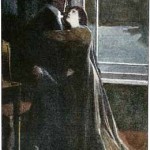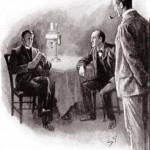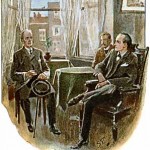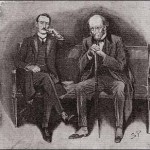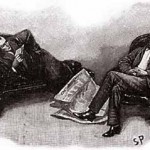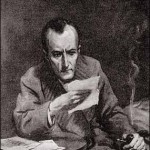“Quite so, you have got an admirable theory. I have no doubt that my own ideas were quite wild, but you must admit that they have ended in discovering the silver.”
“Yes, sir—yes. It was all your doing. But I have had a bad setback.”
“A setback?”
“Yes, Mr. Holmes. The Randall gang were arrested in New York this morning.”
“Dear me, Hopkins! That is certainly rather against your theory that they committed a murder in Kent last night.”
“It is fatal, Mr. Holmes—absolutely fatal. Still, there are other gangs of three besides the Randalls, or it may be some new gang of which the police have never heard.”
“Quite so, it is perfectly possible. What, are you off?”
“Yes, Mr. Holmes, there is no rest for me until I have got to the bottom of the business. I suppose you have no hint to give me?”
“I have given you one.”
“Which?”
“Well, I suggested a blind.”
“But why, Mr. Holmes, why?”
“Ah, that’s the question, of course. But I commend the idea to your mind. You might possibly find that there was something in it. You won’t stop for dinner? Well, good-bye, and let us know how you get on.”
Dinner was over, and the table cleared before Holmes alluded to the matter again. He had lit his pipe and held his slippered feet to the cheerful blaze of the fire. Suddenly he looked at his watch.
“I expect developments, Watson.”
“When?”
“Now—within a few minutes. I dare say you thought I acted rather badly to Stanley Hopkins just now?”
“I trust your judgment.”
“A very sensible reply, Watson. You must look at it this way: what I know is unofficial, what he knows is official. I have the right to private judgment, but he has none. He must disclose all, or he is a traitor to his service. In a doubtful case I would not put him in so painful a position, and so I reserve my information until my own mind is clear upon the matter.”
“But when will that be?”
“The time has come. You will now be present at the last scene of a remarkable little drama.”
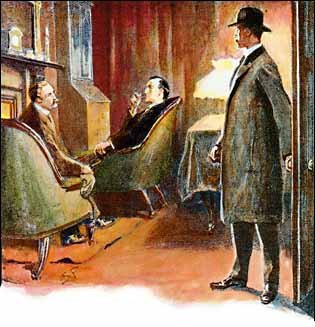
There was a sound upon the stairs, and our door was opened to admit as fine a specimen of manhood as ever passed through it. He was a very tall young man, golden-moustached, blue-eyed, with a skin which had been burned by tropical suns, and a springy step, which showed that the huge frame was as active as it was strong. He closed the door behind him, and then he stood with clenched hands and heaving breast, choking down some overmastering emotion.
“Sit down, Captain Crocker. You got my telegram?”
Our visitor sank into an armchair and looked from one to the other of us with questioning eyes.
“I got your telegram, and I came at the hour you said. I heard that you had been down to the office. There was no getting away from you. Let’s hear the worst. What are you going to do with me? Arrest me? Speak out, man! You can’t sit there and play with me like a cat with a mouse.”
“Give him a cigar,” said Holmes. “Bite on that, Captain Crocker, and don’t let your nerves run away with you. I should not sit here smoking with you if I thought that you were a common criminal, you may be sure of that. Be frank with me and we may do some good. Play tricks with me, and I’ll crush you.”
“What do you wish me to do?”
“To give me a true account of all that happened at the Abbey Grange last night—a TRUE account, mind you, with nothing added and nothing taken off. I know so much already that if you go one inch off the straight, I’ll blow this police whistle from my window and the affair goes out of my hands forever.”
The sailor thought for a little. Then he struck his leg with his great sunburned hand.
“I’ll chance it,” he cried. “I believe you are a man of your word, and a white man, and I’ll tell you the whole story. But one thing I will say first. So far as I am concerned, I regret nothing and I fear nothing, and I would do it all again and be proud of the job. Damn the beast, if he had as many lives as a cat, he would owe them all to me! But it’s the lady, Mary—Mary Fraser—for never will I call her by that accursed name. When I think of getting her into trouble, I who would give my life just to bring one smile to her dear face, it’s that that turns my soul into water. And yet—and yet—what less could I do? I’ll tell you my story, gentlemen, and then I’ll ask you, as man to man, what less could I do?
“I must go back a bit. You seem to know everything, so I expect that you know that I met her when she was a passenger and I was first officer of the ROCK OF GIBRALTAR. From the first day I met her, she was the only woman to me. Every day of that voyage I loved her more, and many a time since have I kneeled down in the darkness of the night watch and kissed the deck of that ship because I knew her dear feet had trod it. She was never engaged to me. She treated me as fairly as ever a woman treated a man. I have no complaint to make. It was all love on my side, and all good comradeship and friendship on hers. When we parted she was a free woman, but I could never again be a free man.
“Next time I came back from sea, I heard of her marriage. Well, why shouldn’t she marry whom she liked? Title and money—who could carry them better than she? She was born for all that is beautiful and dainty. I didn’t grieve over her marriage. I was not such a selfish hound as that. I just rejoiced that good luck had come her way, and that she had not thrown herself away on a penniless sailor. That’s how I loved Mary Fraser.
“Well, I never thought to see her again, but last voyage I was promoted, and the new boat was not yet launched, so I had to wait for a couple of months with my people at Sydenham. One day out in a country lane I met Theresa Wright, her old maid. She told me all about her, about him, about everything. I tell you, gentlemen, it nearly drove me mad. This drunken hound, that he should dare to raise his hand to her, whose boots he was not worthy to lick! I met Theresa again. Then I met Mary herself—and met her again. Then she would meet me no more. But the other day I had a notice that I was to start on my voyage within a week, and I determined that I would see her once before I left. Theresa was always my friend, for she loved Mary and hated this villain almost as much as I did. From her I learned the ways of the house. Mary used to sit up reading in her own little room downstairs. I crept round there last night and scratched at the window. At first she would not open to me, but in her heart I know that now she loves me, and she could not leave me in the frosty night. She whispered to me to come round to the big front window, and I found it open before me, so as to let me into the dining-room. Again I heard from her own lips things that made my blood boil, and again I cursed this brute who mishandled the woman I loved. Well, gentlemen, I was standing with her just inside the window, in all innocence, as God is my judge, when he rushed like a madman into the room, called her the vilest name that a man could use to a woman, and welted her across the face with the stick he had in his hand. I had sprung for the poker, and it was a fair fight between us. See here, on my arm, where his first blow fell. Then it was my turn, and I went through him as if he had been a rotten pumpkin. Do you think I was sorry? Not I! It was his life or mine, but far more than that, it was his life or hers, for how could I leave her in the power of this madman? That was how I killed him. Was I wrong? Well, then, what would either of you gentlemen have done, if you had been in my position?”
“She had screamed when he struck her, and that brought old Theresa down from the room above. There was a bottle of wine on the sideboard, and I opened it and poured a little between Mary’s lips, for she was half dead with shock. Then I took a drop myself. Theresa was as cool as ice, and it was her plot as much as mine. We must make it appear that burglars had done the thing. Theresa kept on repeating our story to her mistress, while I swarmed up and cut the rope of the bell. Then I lashed her in her chair, and frayed out the end of the rope to make it look natural, else they would wonder how in the world a burglar could have got up there to cut it. Then I gathered up a few plates and pots of silver, to carry out the idea of the robbery, and there I left them, with orders to give the alarm when I had a quarter of an hour’s start. I dropped the silver into the pond, and made off for Sydenham, feeling that for once in my life I had done a real good night’s work. And that’s the truth and the whole truth, Mr. Holmes, if it costs me my neck.”
Holmes smoked for some time in silence. Then he crossed the room, and shook our visitor by the hand.
“That’s what I think,” said he. “I know that every word is true, for you have hardly said a word which I did not know. No one but an acrobat or a sailor could have got up to that bell-rope from the bracket, and no one but a sailor could have made the knots with which the cord was fastened to the chair. Only once had this lady been brought into contact with sailors, and that was on her voyage, and it was someone of her own class of life, since she was trying hard to shield him, and so showing that she loved him. You see how easy it was for me to lay my hands upon you when once I had started upon the right trail.”
“I thought the police never could have seen through our dodge.”
“And the police haven’t, nor will they, to the best of my belief. Now, look here, Captain Crocker, this is a very serious matter, though I am willing to admit that you acted under the most extreme provocation to which any man could be subjected. I am not sure that in defence of your own life your action will not be pronounced legitimate. However, that is for a British jury to decide. Meanwhile I have so much sympathy for you that, if you choose to disappear in the next twenty-four hours, I will promise you that no one will hinder you.”
“And then it will all come out?”
“Certainly it will come out.”
The sailor flushed with anger.
“What sort of proposal is that to make a man? I know enough of law to understand that Mary would be held as accomplice. Do you think I would leave her alone to face the music while I slunk away? No, sir, let them do their worst upon me, but for heaven’s sake, Mr. Holmes, find some way of keeping my poor Mary out of the courts.”
Holmes for a second time held out his hand to the sailor.
“I was only testing you, and you ring true every time. Well, it is a great responsibility that I take upon myself, but I have given Hopkins an excellent hint and if he can’t avail himself of it I can do no more. See here, Captain Crocker, we’ll do this in due form of law. You are the prisoner. Watson, you are a British jury, and I never met a man who was more eminently fitted to represent one. I am the judge. Now, gentleman of the jury, you have heard the evidence. Do you find the prisoner guilty or not guilty?”
“Not guilty, my lord,” said I.
“VOX POPULI, VOX DEI. You are acquitted, Captain Crocker. So long as the law does not find some other victim you are safe from me. Come back to this lady in a year, and may her future and yours justify us in the judgment which we have pronounced this night!”

